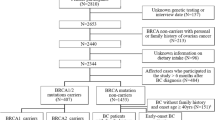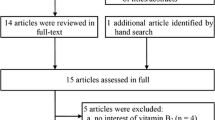Abstract
Purpose
Supplemental folic acid (the more bioavailable and synthetic form of folate) and breast cancer risk in BRCA mutation carriers have not been studied. We evaluated folic acid, vitamin B6 and vitamin B12 supplement use, and breast cancer risk among BRCA mutation carriers.
Methods
In this case–control study, dietary supplement use was collected from BRCA mutation carriers living in Canada. Supplement use was categorized as never or ever use. Total average daily supplement use was categorized as never, moderate, and high use based on tertiles. Unconditional logistic regression was used to estimate the odds ratio (OR) and 95% confidence intervals (CI) for supplement use and breast cancer risk.
Results
We included 129 breast cancer cases and 271 controls. Women who used any folic acid-containing supplement had a significantly decreased risk of breast cancer compared to women who never used a folic acid-containing supplement (OR 0.45; 95%CI 0.25, 0.79; P = 0.006). This was significant for BRCA1 mutation carriers only. The OR for moderate folic acid supplement intake was 0.39; P = 0.01, and high intake was 0.54; P = 0.09, compared to never users. Moderate vitamin B12 supplement intake was associated with decreased risk of breast cancer compared to never use (OR 0.48; 95%CI 0.24, 0.96; P = 0.04).
Conclusions
In this first investigation of folic acid supplement use and breast cancer risk in BRCA mutation carriers, these findings suggest that moderate folic acid- and vitamin B12-containing supplement use may be protective for BRCA-associated breast cancer, particularly among BRCA1 mutation carriers. Future studies with larger samples and prospective follow-up are needed.

Similar content being viewed by others
References
Crider KS, Bailey LB, Berry RJ (2011) Folic acid food fortification-its history, effect, concerns, and future directions. Nutrients 3(3):370–384
Centers for Disease Control and Prevention (2018) Folic acid recommendations. http://www.cdc.gov/ncbddd/folicacid/recommendations.html. Accessed 5 Sept 2018
Health C (2013) Prenatal Nutrition Guidelines for Health Professionals-Folate Contributes to a Healthy Pregnancy. http://www.hc-sc.gc.ca/fn-an/pubs/nutrition/folate-eng.php. Accessed 5 Sept 2018
World Health Organization. Daily iron and folic acid supplementation in pregnant women. http://www.who.int/nutrition/publications/micronutrients/guidelines/summary_guideline_daily_ifa_supp_pregnant_women.pdf?ua=1. Accessed 5 Sept 2018
Caudill MA, Le T, Moonie SA, Esfahani ST, Cogger EA (2001) Folate status in women of childbearing age residing in Southern California after folic acid fortification. J Am Coll Nutr 20(2):129–134
Jacques PF, Selhub J, Bostom AG, Wilson PW, Rosenberg IH (1999) The effect of folic acid fortification on plasma folate and total homocysteine concentrations. N Engl J Med 340(19):1449–1454
Lewis SJ, Harbord RM, Harris R, Smith GD (2006) Meta-analyses of observational and genetic association studies of folate intakes or levels and breast cancer risk. J Natl Cancer Inst 98(22):1607–1622
Larsson SC, Giovannucci E, Wolk A (2007) Folate and risk of breast cancer: a meta-analysis. J Natl Cancer Inst 99(1):64–76
Kim YI (2007) Folate and colorectal cancer: an evidence-based critical review. Mol Nutr Food Res 51(3):267–292
Kotsopoulos J, Kim YI, Narod SA (2012) Folate and breast cancer: what about high-risk women? Cancer Causes Control 23(9):1405–1420
Antoniou A, Pharoah PD, Narod S, Risch HA, Eyfjord JE, Hopper JL et al (2003) Average risks of breast and ovarian cancer associated with BRCA1 or BRCA2 mutations detected in case Series unselected for family history: a combined analysis of 22 studies. Am J Hum Genet 72(5):1117–1130
Narod SA (2010) BRCA mutations in the management of breast cancer: the state of the art. Nat Rev Clin Oncol 7(12):702–707
Kim SJ, Zuchniak A, Sohn KJ, Lubinski J, Demsky R, Eisen A et al (2016) Plasma folate, vitamin B-6, and vitamin B-12 and breast cancer risk in BRCA1- and BRCA2-mutation carriers: a prospective study. Am J Clin Nutr 104:671–677
Scott JM, Weir DG (1998) Folic acid, homocysteine and one-carbon metabolism: a review of the essential biochemistry. J Cardiovasc Risk 5(4):223–227
Ames BN (2001) DNA damage from micronutrient deficiencies is likely to be a major cause of cancer. Mutat Res 475(1–2):7–20
Valentini A, Lubinski J, Byrski T, Ghadirian P, Moller P, Lynch HT et al (2013) The impact of pregnancy on breast cancer survival in women who carry a BRCA1 or BRCA2 mutation. Breast Cancer Res Treat 142(1):177–185
Abraham L, Geller BM, Yankaskas BC, Bowles EJ, Karliner LS, Taplin SH et al (2009) Accuracy of self-reported breast cancer among women undergoing mammography. Breast Cancer Res Treat 118(3):583–592
Patterson RE, Kristal AR, Levy L, McLerran D, White E (1998) Validity of methods used to assess vitamin and mineral supplement use. Am J Epidemiol 148(7):643–649
Zhang Z (2016) Missing data imputation: focusing on single imputation. Ann Transl Med 4(1):9
Chen P, Li C, Li X, Li J, Chu R, Wang H (2014) Higher dietary folate intake reduces the breast cancer risk: a systematic review and meta-analysis. Br J Cancer 110(9):2327–2338
Zhang YF, Shi WW, Gao HF, Zhou L, Hou AJ, Zhou YH (2014) Folate intake and the risk of breast cancer: a dose-response meta-analysis of prospective studies. PLoS ONE 9(6):e100044
Blount BC, Mack MM, Wehr CM, MacGregor JT, Hiatt RA, Wang G et al (1997) Folate deficiency causes uracil misincorporation into human DNA and chromosome breakage: implications for cancer and neuronal damage. Proc Natl Acad Sci USA 94(7):3290–3295
Kim YI (2006) Does a high folate intake increase the risk of breast cancer? Nutr Rev 64(10 Pt 1):468–475
Shiovitz S, Korde LA (2015) Genetics of breast cancer: a topic in evolution. Ann Oncol 26(7):1291–1299
Wu W, Kang S, Zhang D (2013) Association of vitamin B6, vitamin B12 and methionine with risk of breast cancer: a dose-response meta-analysis. Br J Cancer 109(7):1926–1944
Taylor CM, Atkinson C, Penfold C, Bhattacharya S, Campbell D, Davey Smith G et al (2015) Folic acid in pregnancy and mortality from cancer and cardiovascular disease: further follow-up of the Aberdeen folic acid supplementation trial. J Epidemiol Commun Health 69(8):789–794
Hillman RS, Steinberg SE (1982) The effects of alcohol on folate metabolism. Annu Rev Med 33:345–354
Funding
This study was funded by the Champions of Genetics Grant from the Canadian Gene Cure Foundation in partnership with the CIHR Institute of Genetics and Canadian Cancer Society Research Institute (703058). SJK was supported by a Province of Ontario Graduate Scholarship and the Enid Walker Graduate Student Award in Women’s Health Research. JK is the recipient of a Canada Research Chair, tier II, and SAN is the recipient of a Canada Research Chair, tier I.
Author information
Authors and Affiliations
Corresponding author
Ethics declarations
Conflict of interest
The authors declare no potential conflicts of interest.
Ethical approval
All procedures performed in studies involving human participants were in accordance with the ethical standards of the institutional and/or national research committee and with the 1964 Helsinki Declaration and its later amendments or comparable ethical standards.
Informed consent
Informed consent was obtained from all individual participants included in the study.
Electronic supplementary material
Below is the link to the electronic supplementary material.
Rights and permissions
About this article
Cite this article
Kim, S.J., Zhang, C.X.W., Demsky, R. et al. Folic acid supplement use and breast cancer risk in BRCA1 and BRCA2 mutation carriers: a case–control study. Breast Cancer Res Treat 174, 741–748 (2019). https://doi.org/10.1007/s10549-018-05118-3
Received:
Accepted:
Published:
Issue Date:
DOI: https://doi.org/10.1007/s10549-018-05118-3




